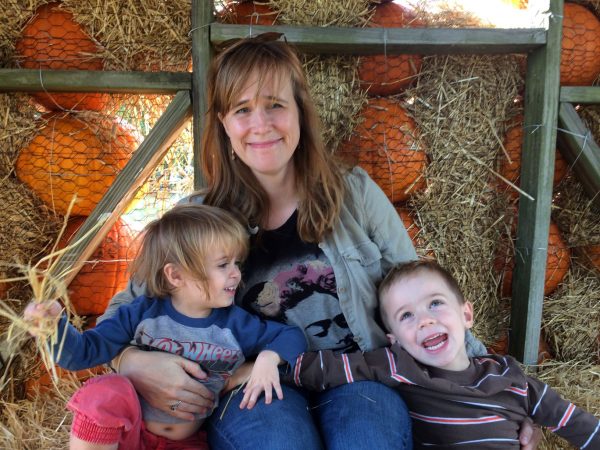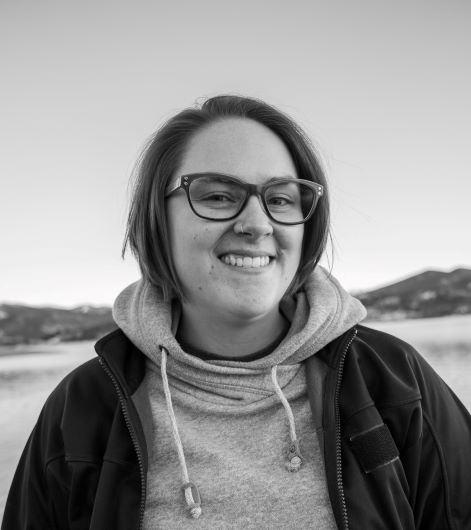 By Colorado Review editorial assistant Heather Gutekunst
By Colorado Review editorial assistant Heather Gutekunst
Fiction writer Holly Goddard Jones is a professor of English at UNCG and teaches fiction writing and creative nonfiction workshops. Her work has appeared in the Southern Review and Appalachian Heritage, and she is the author of the short story collection Girl Trouble (2009) and the novels The Next Time You See Me (2013) and The Salt Line (2017). The following interview has been edited from an email correspondence from April 17, 2021, in which Jones and Heather Gutekunst discuss Jones’s short story “Antipodes,” which was published in the Spring 2021 issue of Colorado Review.
Heather Gutekunst: I’d first like to ask whether there any new writing projects you are currently working on that you are particularly excited about?
Holly Goddard Jones: To be honest, I’m not doing a lot of writing at the moment. I have a story collection coming out next year—“Antipodes” is the title story—and I’m excited about that publication, but I’m still casting about for the next project. It’s been difficult this past year to feel creatively inspired. I have a full-time job and two young children, and my childcare situation under COVID became really complex.
HG: This year, I’ve been thinking a lot about more-than-human intelligence, and your story certainly connected with that rumination. The sinkhole takes on a peculiar intelligence—representing, to me, the size of the protagonist’s grief and loss of self that resembles an uncanny hole widening in the back of her own skull. Do you think there are certain kinds of intelligence that tie us to the earth? Do you find that we (the earth and ourselves) can experience a similar grief or trauma?
HGJ: This is a really smart and interesting question that’s perhaps more theoretical than I’m capable of answering well. I guess what I’ll do is tell you how those images of the sinkhole and the hole in the narrator’s head came together for me, and maybe I’ll answer your question about more-than-human intelligence.
My daughter was born in November of 2016, a couple weeks after the election, and I was not—like many people—in a great place around then. I’d struggled with perinatal depression with [my] first pregnancy, much of it connected to health anxiety—so it wasn’t like my mental unwellness lacked precedent, but the election launched me into a new category of terror and depression. It’s still hard for me to think about and talk about, and “Antipodes” was my attempt. But I remember, when I went to visit my therapist a few weeks after my daughter was born, telling her all my fears about the environment and my children’s future, my constant nightmares, my inability to do much but hold my baby and cry. And she said something like “The content of your anxieties can be valid, but that doesn’t mean the reaction you’re having is proportionate.” I’m probably misquoting her. But that was the seed for the story. What I was feeling then was that I knew, for a fact, that things were terrible and everything had gone wrong, and if I was right, how could anything but despair and immobility be the right reaction?
I want to emphasize that I’m not in that exact same headspace now, and I believe my therapist was right—or close to right. But “Antipodes” was my attempt to connect the two big seasons of perinatal despair I’d weathered. So to come back to your question about more-than-human intelligence, I guess I’ll cop out and refer to Timothy Morton and his theory of hyperobjects. “Antipodes” is about what happens to one woman when she perceives the receding curve of the hyperobject.
HG: The protagonist seems to battle against a lacking sense of self, sometimes represented by the void itself. She seems to exist as mother only. Do you think our culture is especially responsible for stripping women of their personhood when they become mothers? As you convey, there is an enormous amount of pressure we put on mothers. Is the result perhaps a rejection of care regarding postpartum depression?
HGJ: It seems obvious, looking at the story from the outside. She has put every other interest or ambition she’s had on hold to have and rear her children, and even her involvement with the “church” is largely about doing what small thing she can to protect her children from a force she can only watch over without understanding. But I don’t know if my intent with her was clear-cut as the erasure of identity. I think she feels that she’s on the precipice of disaster, and she can’t see beyond the fate of her children; everything else falls to the wayside.
In my experience, there was a lot of attention paid to signs of postpartum depression (much less to perinatal depression, which includes the pre-partum period—that’s a can of worms I won’t open here), and doctors were pretty quick to prescribe SSRIs, which is mostly a good thing. But if I had a critique, it’s that there’s a one-size-fits-all approach to postpartum mental health. We think PPD looks a certain way, and the questionnaires are all geared toward that general picture of the weepy, hormonal new mother who isn’t getting enough sleep, or—in rare cases—to the person who will suddenly harm herself or the child. And maybe we’ve gotten to a place where we see it as a problem to be fixed with Zoloft or therapy or “awareness,” so the new mother can get back to nursing and diapers and work, and not—I don’t know—to some extent rational. A rational reaction to the reality of what you’ve taken on: bringing a new life into the world.
HG: In the year(s) when we experience loss, art appears a reflection, a soother, a shout into the void. This void seems to perfectly represent what we are collectively experiencing right now. To escape, to shelter in place, to steep in fear and anger and denial, is sometimes the best way to learn from and deal with our loss. Although the ending is bleak, why did you think this ending was the right one for her story?
HGJ: It’s not the bleakest ending I contemplated, which was that the narrator would bring Stella with her. I felt guilty planning that ending, I felt guilty when I decided I couldn’t write it, and I feel guilty now telling you about it. But where I landed—I think it had to be this way because it’s both a sacrifice and an escape for the narrator. And that’s what motherhood can feel like in the hardest moments, for me anyway: I would do anything for you, and that’s why I need to get away from you. I need to be relieved of the burden of my love.

Heather Gutekunst is seeking her MA in English Literature at Colorado State University and working as an editorial assistant at Colorado Review. She has worked with a small subsidiary of Black Rose Publishing (La Casita Grande Editores) to publish . . . And Other Stories by Hugo Estaban Rodríguez Castañeda (2018). Her current research considers making productive space for Black Horror in literary criticism.